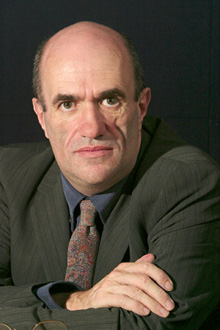Irish novelist fills the house

Photo by Andrew Dobrowolskyj
It was standing room only in the DeSève Cinema on Oct. 15, when two-time Booker nominee Colm Tóibín came to call.
The engaging Tóibín (pronounced Toe-been) gave details about how he wrote his celebrated novel The Master, which is itself about the mysteries of literary creation.
The Master is about the late-19th-century American writer Henry James, a superlative stylist who wrote novels of manners about upper-middle-class Americans in fashionable Europe.
James is known for his long, long sentences and his exquisite sensitivity. The triumph of The Master is that it suggests the depths of suppressed feeling that made James a great writer, and does so in a style that pays homage to James’s own.
Tóibín said that he had read the novels (The Golden Bowl, The Portrait of a Lady, The Americans) as young man, but only became interested in James as a subject when he saw him referred to as a gay writer. James was both highly social and deeply cautious in an age that was intolerant of homosexuality, and Tóibín realized that the suppression of his sexual nature could be a key to understanding the man and his work.
James was part of a famous family. His older brother, the writer and lecturer William James, had an entirely different temperament, and the two brothers had a tempestuous relationship that is explored to great effect in The Master.
Tóibín said that he had almost too much material to draw on, including Leon Edel’s five-volume biography of James, but he also developed his own research methods.
He listened to the speech of staff in the New York Public Library, he got a young American graduate student to go around Venice with him in imitation of James and his niece, and he spent time with an aristocrat to study posh people, as he called them.
He also listened with fascination to a BBC radio interview made in 1956 with Burgess Oakes, James’s trusty manservant, who had been hired nearly 60 years earlier, in 1897. Oakes recalled details about James’s domestic life that greatly enriched The Master, including the Smiths, a couple of dipsomaniacal servants.
Similarly, the recollections of an aging society woman in Venice who remembered James’s great friend, the novelist Constance Fenimore Woolson, suggested the possibility that she killed herself over him.
Tóibín used that idea in his novel, and read several excerpts to the audience that showed how he imagined the sensitive but evasive James would have reacted to her death.
Tóibín’s appearance at Concordia was organized by the English Department in concert with the Centre for Canadian Irish Studies and Lower Canada College, where he also spoke. He was entertained after his talk by Concordia president Frederick Lowy and his wife, Mary Kay, both psychoanalysts and great readers.